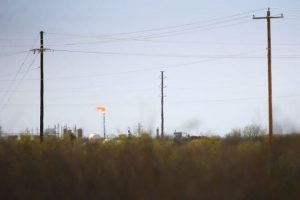
A gas flare is seen from the highway heading out of Pecos on April 9. Photo by: Briana Sanchez/ El Paso Times
By Martha Pskowski, El Paso
El Paso Times | October 26, 2021
The economic recession that began in March 2020 due to the pandemic put a dent in oil and gas production, but the Permian Basin in West Texas and Eastern New Mexico is emerging from the slump.
According to a government report released Oct. 18, the Permian Basin is on track to produce 4.8 million barrels of oil a day in October. The region has nearly recovered to the 4.9 million barrels-a-day March 2020 record.
While the recovery is good news for the oil and gas industry, the Permian Climate Bomb report from the environmental organizations Earthworks, Oil Change International and the Center for International Environmental Law calls the fossil fuel production in the Permian bad news for the climate.
Political momentum for climate action is growing in the U.S., as President Joe Biden pushes for climate spending in Congress and the COP26 Climate Change Conference in Glasgow, Scotland, approaches, beginning Sunday and running through Nov. 12.
Continued greenhouse gas emissions from the Permian will complicate reaching climate targets, according to the report.
“Unless President Biden defuses the Permian climate bomb exploding in my backyard, we won’t prevent catastrophic climate change or meet our national climate commitments,” said El Paso’s Miguel Escoto, Earthworks West Texas Field Advocate.
The report found that oil production in the Permian Basin has grown five-fold in the past decade. Over the next 30 years, it could produce more oil, gas and gas liquids than in the entire past century.
The Permian Basin alone accounted for 30% of U.S. crude oil production and 14% of U.S. natural gas production in 2020.
The Intergovernmental Panel on Climate Change of the United Nations recommends nations reduce greenhouse gas emissions rapidly to keep global warming below 1.5 degrees Celsius. Consumption of fossil fuels is a primary driver of greenhouse gas emissions.
Unprecedented gas production in the Permian Basin is possible using the controversial extraction method hydraulic fracturing, or fracking. While natural gas produces less carbon dioxide than other fossil fuels, fracking releases large amounts of methane, a highly potent greenhouse gas.
“To head off climate catastrophe, oil and gas production and consumption must decline,” the report authors write. “The opposite is happening in the Permian Basin.”
Gas production in the U.S. now exceeds demands, so much of the gas produced in the Permian is exported. The report outlines how the industry has built infrastructure from the Permian to the Gulf Coast to export the excess gas as liquid natural gas. Other pipelines carry Permian Basin gas to the El Paso area.
“We need to increase awareness about the emissions in the Permian Basin,” said Earthworks senior field advocate Sharon Wilson, whose property in Wise County, Texas, was impacted by hydraulic fracturing. “And the fact that the state of Texas is not doing its job to regulate the oil and gas industry.
“It’s a system where the industry voluntarily submits information if they have an emission event or a spill,” she said. “That’s like you voluntarily telling the police you were speeding on I-10.”
As an optical gas imaging thermographer, Wilson documents gas flaring and methane emissions at sites in the Permian Basin. “Sometimes it’s so bad that people cannot stay in their home and they have to leave,” she said.
Some natural gas and oil companies in the Permian have taken steps to certify their emissions reductions.
A representative of the Permian Basin Petroleum Association said, “We firmly believe that Permian Basin natural gas is key in reducing global emissions as well as the successes our operators have had in their efforts to reduce emissions in producing natural gas.”
Ethane, derived from gas liquids, from the Permian Basin also has fueled a plastic processing and manufacturing boom along the Gulf Coast. The report says these chemical plants are located in communities that already experience significant pollution, which are often communities of color and working class.
Earthworks called on Biden to “immediately deny new oil and gas infrastructure permits.” The report also calls on the Department of the Interior to end new fossil fuel leases and permits on public lands, where much of the Permian Basin drilling and fracking takes place.
The multimedia report will be released in six parts on the Permian Climate Bomb website.
Staff writer Martha Pskowski may be reached at mpskowski@elpasotimes.com and @psskow on Twitter
This article originally appeared in the El Paso Times.

